|
|
|
Sort Order |
|
|
|
Items / Page
|
|
|
|
|
|
|
| Srl | Item |
| 1 |
ID:
130027
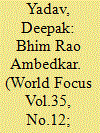

|
|
|
|
|
| Publication |
2014.
|
| Summary/Abstract |
Dr Ambedkar's legacy as a socio-political reformer had a deep effect on modern India. He believed that "political democracy without social democracy and economic justice is meaningless." In post-Independence India his socio-political thought has acquired respect across the political spectrum. His initiatives have influenced various spheres of life and transformed the way India today looks at socio-economic policies, education and affirmative action through socio-economic and legal incentives. His reputation as a scholar led to his appointment as free India's first law minister, and chairman of the committee responsible to draft a constitution. He passionately believed in the freedom of the individual and criticized equally both orthodox casteist Hindu society.
|
|
|
|
|
|
|
|
|
|
|
|
|
|
|
|
| 2 |
ID:
027012
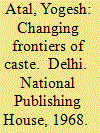

|
|
|
|
|
| Publication |
DelhI, National Publishing House, 1968.
|
| Description |
xx, 288p.
|
|
|
|
|
|
|
|
|
|
|
|
Copies: C:1/I:0,R:0,Q:0
Circulation
| Accession# | Call# | Current Location | Status | Policy | Location |
| 000869 | 305.5122/ATA 000869 | Main | On Shelf | General | |
|
|
|
|
| 3 |
ID:
131613
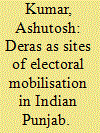

|
|
|
|
|
| Publication |
2014.
|
| Summary/Abstract |
Mushrooming of the deras in Indian Punjab, and the role of some of these deras in influencing the political choices of their followers, most of whom belong to the socially and economically marginal groups, is being recognised and apparently encouraged by the political parties. This is evident in the fact that political leaders/candidates cutting across party divides flocked to various deras in the run-up to the recent elections. This phenomenon can be attributed primarily to the fact that the social basis of political power of state has remained unaltered in favour of the upper castes/communities. Unwilling to share power, yet compelled to seek the crucial support of numerically strong and economically mobile dalit and other backward castes voters in a closely contested bi-polar polity, the upper-caste political leadership takes recourse to the 'softer' option of cultivating the deras to 'deliver' en bloc the marginal-castes votes. With one form of the identity politics based on ethno-regional communal divide having receded to background, it is the turn of the caste-based identity politics through the 'dera route' that is prevailing in post-militancy Punjab.
|
|
|
|
|
|
|
|
|
|
|
|
|
|
|
|
| 4 |
ID:
167118
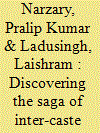

|
|
|
|
|
| Summary/Abstract |
In India marrying across the caste kindles strong community resentment, leading to the extent of honor killing, yet few couples dare to defy this stringent social norm. Analysis of large-scale survey (India Human Development Survey 2011–12) data exhibits an inconsequential rise in this social incongruity since 1951 to attain 4.5% in 2012. It is most prevalent in the northeastern region (11.6%), but least prevalent in caste-ridden central India (1.8%). Multi-variate statistics exhibit that if women are allowed to choose their life-partner, caste takes a rear-seat in marriage contemplation. It is quite prominent among the women who selected the husband by themselves and knew the husband at least one year before the marriage. Contrary to general notion, education is not able to promote inter-caste marriage. Odds of inter-caste marriage taking place in Dalit (lowest social standing) households is much lesser than the higher caste. Resilient targeted efforts are necessary to promote inter-caste marriage, which may loosen the noose of the caste system in India.
|
|
|
|
|
|
|
|
|
|
|
|
|
|
|
|
| 5 |
ID:
119974


|
|
|
| 6 |
ID:
152627
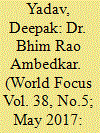

|
|
|
|
|
| Summary/Abstract |
Dr. Ambedkar was a victim of caste discrimination. His parents hailed from the Hindu Mahar caste, which was viewed as “untouchable” by the upper class. Due to this, Ambedkar had to face severe discriminations from every corner of the society. The discrimination and humiliation haunted Ambedkar even at the Army school, run by British government. Fearing social outcry, the teachers would segregate the students of lower class from that of Brahmins and other upper classes.
|
|
|
|
|
|
|
|
|
|
|
|
|
|
|
|
| 7 |
ID:
173341
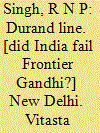

|
|
|
|
|
| Publication |
New Delhi, Vitasta Publishing Pvt Ltd, 2020.
|
| Description |
xxxix, 310p.hbk
|
| Standard Number |
9789386473929
|
|
|
|
|
|
|
|
|
|
|
|
Copies: C:1/I:0,R:0,Q:0
Circulation
| Accession# | Call# | Current Location | Status | Policy | Location |
| 059893 | 911.581/SIN 059893 | Main | On Shelf | General | |
|
|
|
|
| 8 |
ID:
152633
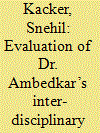

|
|
|
|
|
| Summary/Abstract |
Dr. Ambedkar’s ideas have inspired innumerable scholars across disciplines and ages. Dr. Ambedkar was much ahead of his times and contemporaries. He gave crucial insights in the then prevalent problems which hold relevance even till date. Hence his views still have universal appeal.
|
|
|
|
|
|
|
|
|
|
|
|
|
|
|
|
| 9 |
ID:
171295
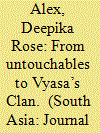

|
|
|
|
|
| Summary/Abstract |
This article examines the processes involved in the creation of a caste community called the Dheevaras in the South Indian state of Kerala in the early twentieth century. Although deemed an untouchable caste, the Dheevaras contested their untouchable status through various myths and histories, and this contestation was reflected in the Dheevara reform movement’s continuities with and departures from mainstream Hinduism and the caste system. While Dheevara reformers advocated a mainstream Hindu identity and claimed an honoured past for the community, they challenged Sanskritic Hinduism in defending the occupation of fishing. The reformers, however, strictly followed upper-caste Hindu patriarchal norms when imagining Dheevara womanhood, making women the bearers of caste honour.
|
|
|
|
|
|
|
|
|
|
|
|
|
|
|
|
| 10 |
ID:
142249
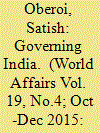

|
|
|
|
|
| Summary/Abstract |
The original Indian varna order has degenerated into a rigid caste system with more faults than merits and must be reinvented to keep abreast of modern times. Satish Oberoi examines the causes of the distortions and suggests measures to rectify or even eliminate them. He however concludes that the elimination of the varna system could cause serious problems, leaving the country with limited options for dealing with its current sociopolitical problems and he proposes various reforms to improve governance.
|
|
|
|
|
|
|
|
|
|
|
|
|
|
|
|
| 11 |
ID:
128176
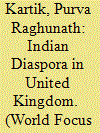

|
|
|
|
|
| Publication |
2014.
|
| Summary/Abstract |
After 1950s a large number of Indians migrated to United Kingdom (UK) with cultural, traditions and religious values and practices, which included practice of caste discrimination too. As Dr. BR Ambedkar anticipated, the Indian migrants will carry the caste system to other regions of earth and it would become a problem of the world. This prediction came true as cast discrimination has indeed migrated with the Indian Diaspora to east and south Africa, Mauritius, Fiji, Surinam, the middle east (for example in Bahrain, Kuwait, the United Arab Emirates), Malaysia, the Caribbean, the United Kingdom, North America, and other regions (Natural 2001). With the other Indian Diaspora dalits (untouchables) of India also migrated to the UK. It has been estimated that around 250000 dalits are living in the UK (CERD 79, UK Report.).
|
|
|
|
|
|
|
|
|
|
|
|
|
|
|
|
| 12 |
ID:
140468
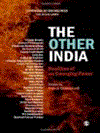

|
|
|
|
|
| Publication |
New Delhi, Sage Publications India Pvt Ltd, 2009.
|
| Description |
xxviii, 274p.hbk
|
| Standard Number |
9788132102243
|
|
|
|
|
|
|
|
|
|
|
|
Copies: C:1/I:0,R:0,Q:0
Circulation
| Accession# | Call# | Current Location | Status | Policy | Location |
| 058300 | 330.954/CHA 058300 | Main | On Shelf | General | |
|
|
|
|
| 13 |
ID:
128122
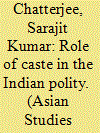

|
|
|
|
|
| Publication |
2013.
|
| Summary/Abstract |
It is perhaps true that the most frequently mentioned peculiarity of the traditional Hindu Society is the institution of caste, or as it is more frequently called, the caste system. Social institutions that resemble caste in one respect or the other are not difficult to find elsewhere, but it is only in India that it is know as 'caste'.
|
|
|
|
|
|
|
|
|
|
|
|
|
|
|
|
|
|
|
|
|